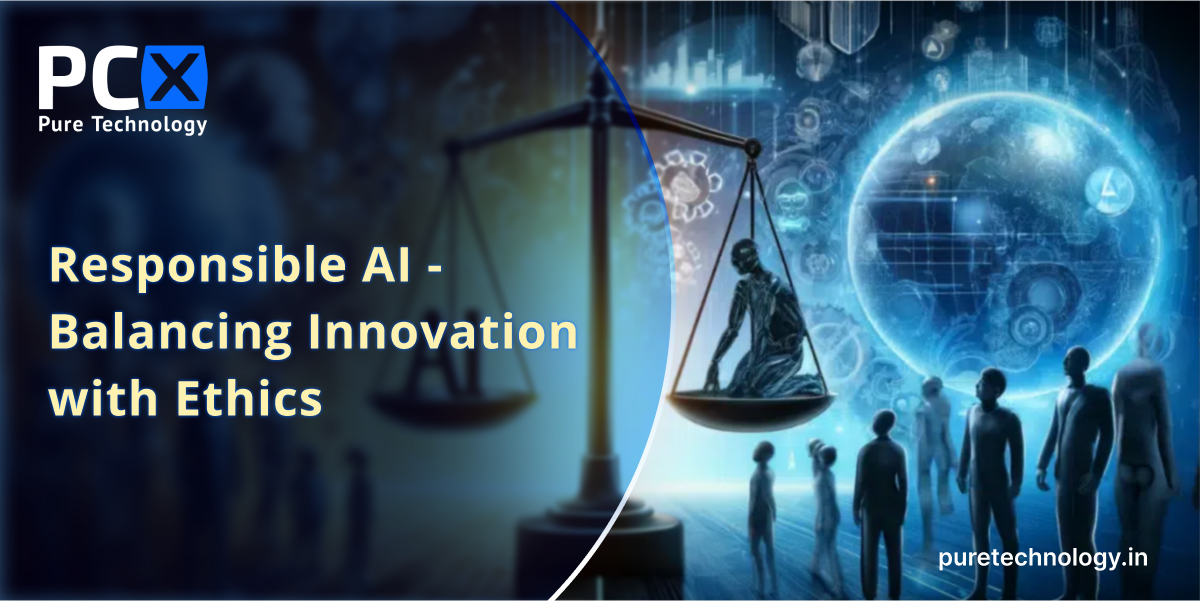Responsible AI: Balancing Innovation with Ethics
Introduction
As AI technologies accelerate innovation, 2025 marks a turning point where organizations are under pressure to balance innovation with responsibility. Businesses, policymakers, and researchers are aligning on the need for ethical AI practices to ensure that AI benefits society without amplifying risks such as bias, privacy breaches, or misinformation. Responsible AI emphasizes transparency, fairness, accountability, and sustainability, making it a cornerstone of future innovation.
Transparency in AI Algorithms
One of the biggest concerns around AI is the “black box” effect, where decisions are made without clear reasoning. In 2025, companies are adopting:
- Explainable AI (XAI): Models that provide human-understandable insights into decision-making.
- Regulatory frameworks: Governments are pushing for algorithmic audits and disclosures.
- User-facing transparency: Platforms now inform users about when and how AI influences outcomes.
Transparency ensures that AI does not become an unchallengeable authority but rather a trustworthy tool for decision-making.
Fairness and Bias Mitigation
AI systems often reflect the biases present in training data. Left unchecked, this can reinforce societal inequalities. To counter this, organizations are focusing on:
- Bias detection tools that analyze datasets before model training.
- Fairness-aware algorithms designed to minimize discriminatory outputs.
- Inclusive datasets that reflect diverse demographics and global perspectives.
By embedding fairness, AI becomes a tool for equality rather than exclusion.
Ethical Data Usage
Data is the backbone of AI, but unethical practices like data scraping without consent or misusing personal information can lead to distrust. In 2025, ethical AI implementation requires:
- Data minimization: Collect only what’s necessary.
- Consent-driven practices: Ensure users are informed and opt-in for data usage.
- Strong security standards: Protecting data against misuse and breaches.
Respecting privacy is not just a regulatory requirement — it’s also a competitive advantage, as users increasingly trust companies that demonstrate ethical data practices.
Accountability and Governance
Responsible AI isn’t just a technical matter; it requires clear governance structures:
- AI ethics boards within organizations for oversight.
- Third-party audits for unbiased evaluations.
- Global collaboration on AI standards to avoid fragmented approaches.
Accountability ensures AI systems align with human values and legal frameworks.
Sustainable AI Innovation
AI innovation must also account for environmental and social sustainability:
- Green AI practices focus on reducing energy consumption in model training.
- Socially beneficial AI supports applications in healthcare, education, and climate change.
- Long-term impact assessments help evaluate the societal consequences of AI deployments.
Sustainability ensures AI remains a force for good, balancing progress with responsibility.
Conclusion
Responsible AI is no longer optional — it’s the foundation for long-term innovation in 2025 and beyond. By prioritizing transparency, fairness, ethical data usage, accountability, and sustainability, organizations can foster trust while driving impactful technological progress. In this era, success is not just about how advanced AI becomes but how responsibly it is applied.
FAQs
Q1: What is responsible AI?
Responsible AI is the practice of designing, developing, and deploying AI with a focus on ethics, transparency, fairness, and accountability to ensure it benefits society.
Q2: How can AI bias be mitigated?
Bias can be mitigated through diverse datasets, algorithmic audits, fairness-aware models, and continuous monitoring during deployment.
Q3: Why is transparency important?
Transparency helps stakeholders understand how AI makes decisions, fostering trust, accountability, and regulatory compliance.
Q4: What role does sustainability play in responsible AI?
Sustainability ensures that AI innovation considers both environmental impact (like reducing energy use in large models) and social benefits (such as healthcare and education improvements).
Q5: Who is responsible for enforcing AI ethics?
Responsibility lies across organizations, governments, and global institutions, requiring a collaborative approach to ensure consistent standards.
Call us for a professional consultation












Leave a Reply